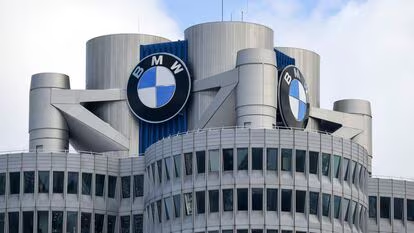BMW downplays US tariff fears as car stocks hit multi-year lows

BMW’s CEO mentioned on Wednesday that probable import tariffs during Donald Trump’s presidency could work in favor of the company. This statement comes amidst a decline in the stock prices of BMW and other luxury car manufacturers, driven by fears of the industry being negatively impacted by increasing trade tensions.
Concerns regarding potential import tariffs, which have been warned by Trump on products originating from the EU, led to a significant decrease in the stock prices of BMW, Volkswagen, Mercedes-Benz, and Porsche by 5.2-7.7%, making them some of the major losers in the European market.
The stock of BMW plummeted to its lowest point in four years due to disappointing third-quarter results. In contrast, shares of Porsche, a company without production facilities in the US, fell to their lowest value since its IPO in September 2022.
Oliver Zipse, the CEO of BMW, aimed to reassure stakeholders following the presentation of disappointing third-quarter results by highlighting the company’s robust presence in the local market, including its largest global manufacturing facility.
Goldman Sachs predicts that Volvo Cars would face the most significant EBIT challenge if the United States decides to raise tariffs by 7.5-17.5 percent, with Mercedes, Porsche, BMW, and VW to follow suit.
BMW’s largest factory globally, situated in Spartanburg, South Carolina, churns out over 1,500 vehicles daily and serves as a primary supplier to various markets such as Germany, China, and Britain.
During the discussion with reporters following the release of the third-quarter results, Zipse emphasized that BMW could potentially benefit even further in the event of tariffs, citing the substantial presence the company has in the USA.
Zipse reassured that there is no need to be overly anxious about potential outcomes, mentioning that BMW has a presence in 30 different sites spanning 12 states in the US.
According to him, the majority of BMW’s vehicle sales in the US originate from Spartanburg. He also mentioned BMW’s dedication to expanding investments in the facility, which currently employs over 11,000 individuals.
BMW experienced a 2.1% decline in deliveries within the United States during the initial nine months of 2024, with a total of 271,399 vehicles sold.
In 2023, the Spartanburg plant manufactured 410,793 vehicles, with over half of them being shipped to 120 countries. This provides BMW with a significant opportunity to increase local sales in case tariffs are imposed on imported vehicles.
The Tuscaloosa, Alabama, and Charleston, South Carolina production facilities of Mercedes-Benz were responsible for manufacturing 346,600 vehicles last year, making up approximately 14% of the company’s overall sales. Interestingly, around two-thirds of the vehicles produced at the Tuscaloosa plant are destined for export markets.
In 2023, approximately 175,000 vehicles were manufactured at Volkswagen’s Chattanooga, Tennessee plant.













